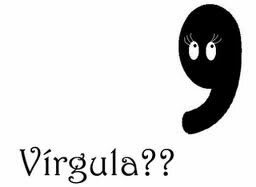Whenever we talk about the comma, it is good to remember the differences in speech and writing. Would it be possible to identify, in writing, the pauses we make, the expressions of amazement, happiness, the resumption of thought, the questions, among other elements?
Certainly not, as many of these procedures are manifested through gestures, facial expressions (a look, a smile, sometimes even a face of anger). In writing, all this is demonstrated thanks to punctuation marks, that is, when we want to ask a question, we use the question mark; when we want to demonstrate different feelings, such as joy or amazement, we use the exclamation point; to close our ideas, the final point; and so on. Ah! there is still one that indicates that “stop”, somewhat similar to the speech. Of course you've already figured it out, isn't that right?

Well, it's her we're talking about. However, it is essential to understand that its existence is not related to the little stop that we said before, as it is also conditioned by other factors. But don't worry, as we get to know the circumstances under which we should or shouldn't use it, we'll understand what those factors are. Let's go then?

The comma is used whenever we want:
* Separate toponyms (proper place names) followed by date:
São Paulo, November 12, 2009.
* Isolate terms arranged in enumeration:
We went to the movies, had ice cream, visited the woods, and then returned home.
* Separate explanatory, continuous or corrective expressions (relating to the correction of something), such as: that is, for example, alias, etc.:
Tomorrow, or rather the day after tomorrow, we will travel to my grandparents' house. (correction idea)
There are many uses of the comma, for example: separating elements expressed in an idea. (explanation idea)
* Separate the bet and the vocative:
Beatrice, friend of my cousin, received the award. (we understand that the term that appears between commas is the affixed)
Dear friend, lend me the book. (the underlined term represents the vocative)
* Separate an adverbial adjunct, which may be anticipated or inserted:
in the family, we are all united. (adverbial early adverbial)
Every Sunday, at my grandparents' house, the whole family gathers. (adverbial interspersed, that is, in the middle of the sentence)
* Isolate sentences composed of some conjunctions that give the idea of alternation, explanation, adversity (opposite idea) and conclusion:
- Didn't attend your birthday, although sent the gift. (opposite idea)
- Or study for the evaluation, or solve the exercises. (toggle idea)
- We didn't go to the movies, because it rained a lot. (explanation idea)
- My cousins arrived from a trip, soon, we will visit them. (conclusion idea)
Let's see the cases in which we should not use it:
* To separate the subject from the predicate:
The boy is studious.
(subject) (predicate)
* To separate the verb from its complement:
I like chocolate.
(predicate) (complement)
Take the opportunity to check out our video lesson related to the subject:

